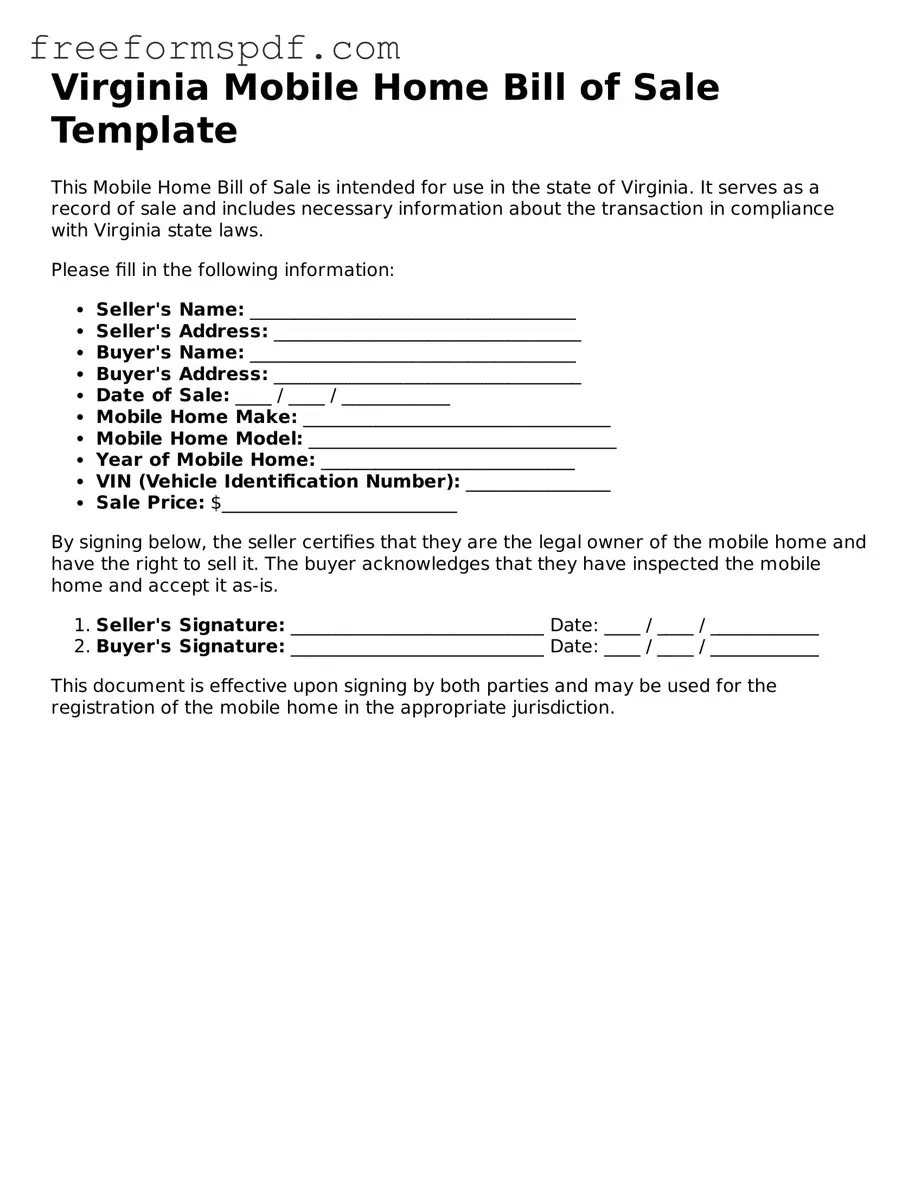Attorney-Verified Mobile Home Bill of Sale Document for Virginia State
Common mistakes
-
Incorrect Information About the Mobile Home: One of the most common mistakes is providing inaccurate details about the mobile home. This includes the make, model, year, and VIN (Vehicle Identification Number). Ensure all information matches the documents.
-
Missing Signatures: Both the seller and buyer must sign the Bill of Sale. Failing to include signatures can render the document invalid. Double-check that all required signatures are present before finalizing the sale.
-
Not Including the Sale Price: Omitting the sale price can lead to confusion and potential disputes later on. Clearly state the amount agreed upon for the sale to avoid any misunderstandings.
-
Neglecting to Date the Document: A common oversight is forgetting to include the date of the transaction. This date is crucial for legal purposes and can affect the transfer of ownership. Always ensure the date is clearly noted.
Learn More on This Form
-
What is a Virginia Mobile Home Bill of Sale?
A Virginia Mobile Home Bill of Sale is a legal document that serves as proof of the transfer of ownership of a mobile home from one party to another. This document outlines the details of the sale, including the names of the buyer and seller, the description of the mobile home, and the sale price.
-
Why is a Bill of Sale necessary for mobile homes in Virginia?
A Bill of Sale is important for several reasons. Firstly, it provides a clear record of the transaction, which can help prevent disputes in the future. Secondly, it is often required by the Virginia Department of Motor Vehicles (DMV) for registering the mobile home in the new owner's name. Without this document, the buyer may face challenges in establishing legal ownership.
-
What information is included in a Virginia Mobile Home Bill of Sale?
The Bill of Sale typically includes the following details:
- The names and addresses of both the buyer and seller
- A description of the mobile home, including the make, model, year, and Vehicle Identification Number (VIN)
- The sale price of the mobile home
- The date of the sale
- Signatures of both parties
-
How do I complete a Virginia Mobile Home Bill of Sale?
To complete the Bill of Sale, both the buyer and seller should fill out the required information accurately. It is essential to ensure that all details match the official records of the mobile home. After filling out the form, both parties should sign it to validate the transaction. It is advisable to keep a copy for personal records.
-
Do I need to have the Bill of Sale notarized?
In Virginia, notarization is not a requirement for a Bill of Sale for mobile homes. However, having the document notarized can add an extra layer of protection and authenticity. It may be beneficial if there are any future disputes regarding the sale.
-
Where do I file the Bill of Sale after completing it?
After completing the Bill of Sale, the buyer should take it to the Virginia DMV to register the mobile home in their name. It is important to do this promptly to avoid any issues with ownership or legal responsibilities. The seller should also retain a copy for their records.
Misconceptions
When dealing with the Virginia Mobile Home Bill of Sale form, it's important to clarify some common misconceptions. Understanding these can help ensure a smoother transaction for all parties involved.
- The form is only necessary for new mobile homes. Many believe that the Bill of Sale is required only for new mobile homes. In reality, this form is essential for both new and used mobile homes. It serves as a legal record of the transaction, regardless of the home's age.
- Once the Bill of Sale is signed, ownership is automatically transferred. Some people think that signing the Bill of Sale instantly transfers ownership. While the form is an important step, it must be accompanied by other actions, such as registering the mobile home with the appropriate state agency to complete the transfer process.
- The Bill of Sale does not need to be notarized. A common misconception is that notarization is unnecessary. However, having the Bill of Sale notarized can provide an extra layer of protection for both the buyer and seller, verifying the identities of the parties involved and the authenticity of the transaction.
- Any written agreement can serve as a Bill of Sale. Some individuals believe that any informal written agreement can act as a Bill of Sale. This is not true. The Virginia Mobile Home Bill of Sale form has specific requirements and language that must be included to be legally valid. Using the proper form ensures compliance with state laws.
Being informed about these misconceptions can help facilitate a successful mobile home transaction in Virginia. Always ensure that you have the correct documentation and understand the process involved.
Some Other Mobile Home Bill of Sale State Templates
Free Printable Bill of Sale for Mobile Home - Records the details of the sale including buyer and seller information.
Manufactured Home Transfer of Ownership - An important step in ensuring a smooth ownership transfer.
The NYCERS F170 form, essential for certain members of the New York City Employees Retirement System, can be further explored through resources like NY Templates. This form is particularly important for Tier 1 and Tier 4 members who wish to enroll in the Optional 25-Year Retirement Program for Emergency Medical Technicians, and it outlines the necessary eligibility requirements to facilitate their application process.
How to Sell My Mobile Home - Details any liens or claims against the mobile home if applicable.
